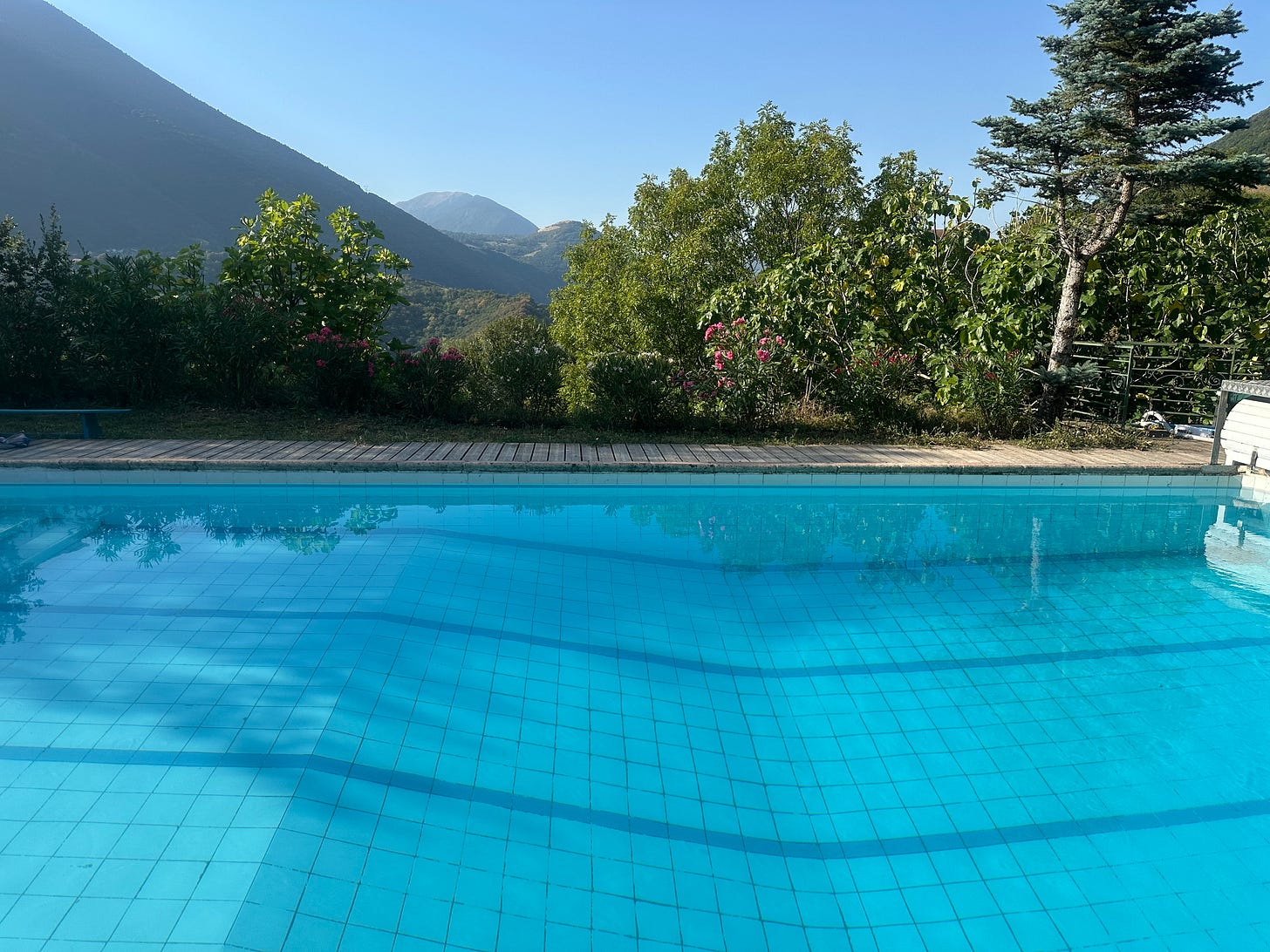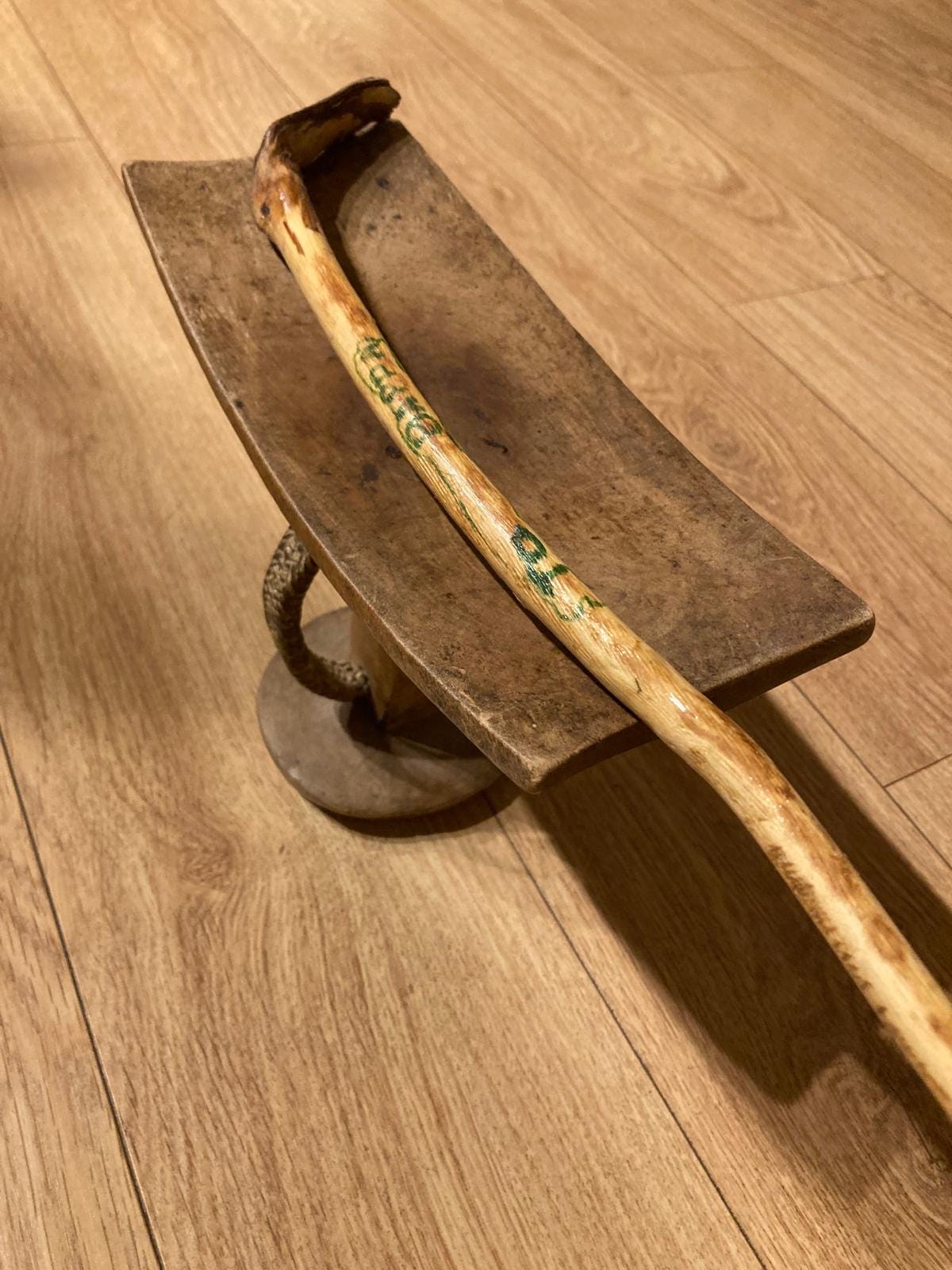“We cannot get anything out of life. There is no outside where we could take this thing to. There is no little pocket situated outside of life, [to which we could] steal life’s provisions and squirrel them away. The life of this moment has no outside.”
Jennifer Matthews
I recently wrote about my vaulting holiday ambitions to cultivate a Vita Contemplativa. This kind of happened, just not the way I had intended.
We did a home exchange to a nice farm house with a beautiful pool in the French alps. I love mountains, swimming pools, croissants, and my family (not in that order). There was nothing not to like. And yet, I was like a man possessed. My hurry-up driver was fully charged, buzzing, and utterly insufferable to be around.
In workaday life, there’s generally plausible justifications for being in an endless hurry; what fully operational adult do you know that doesn’t have an endless list of things to do? Though on holiday my reasoning felt feeble, and faintly ridiculous. I would go for a run, read a book by the pool for half an hour until about 9am, before urgently announcing to my perfectly contented family who were lounging by the pool that we must go. We are wasting the day; there are chateaux’s to see and mountains to climb, there is not a moment to spare.
I wasn’t exactly creating the mood music of a holiday, and began to irritate even myself. Where was it coming from? Why did it feel so acute?
This is not a new inquiry for me, as some of you know. I wrote a masters dissertation on presence as a virtue, in which I argued that culture has become more left-brained and utilitarian, making us less present to each other and ourselves. This research-as-me-search approach only takes you so far, and was a bit of a copout. I was ostensibly wrestling with an issue without ever lifting the bonnet on my own emotional life. I have form with this.
We’ve got time
It was a holiday conversation with Eira, my youngest daughter, that sent me into a bit of introspection. I was doubtless hurrying us all, as per, when she said in a voice as strong as it was gentle ‘I don’t really understand why you’re hurrying Daddy. We’ve got time.’ It was delivered with a squeeze of the hand and the sense that she was telling me something I’d forgotten, and really needed to hear. Time is what we have, and in some sense it’s all we have.
I’ve reflected on this a lot since then, and concluded that the whirlwind of activity I conjure, is partly an expression of a scarcity mindset. Time is short, life is horribly unpredictable. I live in subconscious anticipation of a wrecking ball demolishing my normality without warning. It’s happened before. It will happen again, as inevitable as the changing of the seasons.
I don’t know when this nerve-jangling disposition took hold, by degrees over time I suspect. A possible origin story is a memory I have of being about 6 or 7. I carved a walking stick for my grandfather, and I was very proud of it - although it was sized for an Oompa Loompa. I couldn’t wait to give it to him that weekend, though he died a few days before I was got to see him. I was blindsided; not only devastated by his dying, but by this outrageous new insight into how life could be, or just suddenly not be. It spawned a sense of fragility in my developing brain; a searing awareness that the present is always pregnant with disaster. Reminders of this seem to litter daily life today, even in the best of times.
(Photo of said walking stick which I just discovered my dad kept)
Responses to a sense of life’s precarity vary. You could become ultra cautious or turn into a prepper, seeking protection from life’s vicissitudes. I’m not organised enough for that. Plus it’s a dull strategy. The alternative is to spend your time like it’s going out of fashion. Do as much as possible, do it now. Carpe diem, live each day as if it’s your last, or whatever other bromides you want to sanctify this philosophy with.
Clearly I find myself in this latter camp, which has some kerb-appeal, and looks a bit virtuous compared to the alternative. Though the experience of life it produces is one of anxiety cosplaying excitement. It’s like living in that 90’s Richard O’Brian gameshow The Crystal Maze, where teams compete in frenzied challenges to try and get more time in a money filled dome. Only there’s no dome and you can’t buy time, which makes it all seem a bit more futile. So what is the ideal between these two states?
Having a word with yourself
While it’s empirically true that we don’t know what’s round the next corner, this doesn’t need to contaminate the time we do have.
The solution is as simple as it is difficult to implement. It is to re-learn that lesson all young children seem to just know - this moment right now we have time to do what we’re doing, otherwise we wouldn’t be doing it. An awareness of this somehow releases you to show up to who you’re with, where you are, and what you’re doing a bit more fully. Of course life can be derailed at any moment, we’re reminded of this far too often. Though the task is not to let that fact force you into hiding or hurrying. You have time to be here, in fact - that is what the time you do have is for. There is abundance in this thought.
Clearly it is much easier said than done; changing mindset takes deliberate and frequent attention. My daughter’s words ‘we’ve got time’, coupled with a squeeze of the hand embody two ways I’ve found that help.
1) Firstly - having words with myself. My nervous disposition is really that scared boy inside me who is often at the wheel. He wants to hurry because time feels unpredictable and scarce. He needs permission to release his grip and take his foot off the gas. This is deep work, where you learn to speak to those different parts of yourself and allow that calm adult voice to feel like a caring and compassionate parent to those anxious parts of you. ‘It’s okay, we don’t need to hurry. We’re here, and we’ve got time to be here - can you trust me on this?’
2) Secondly - that squeeze of the hand. It is easier to change the mind through the body, than to change the way I think and feel through the mind. 80% of the signals coming to to the mind come through the body, so it is through somatic practices that we can change the mind. This means breathing deliberately and slowly, cold water immersion, receiving and giving big hugs. These are all regulating to the body, and calming to the mind. They allow me to become more present, to show up more fully.
There are libraries of wisdom and research on how to do both of the above.
The work that is yours to do
My issues are not yours. I’m writing about them here because it brings me clarity, and hopefully you’ll catch glimpses of yourself in some aspects of it. Maybe it’s not a sense of fragility that you’re programmed with, but it could be something else unhelpful. I think adulting is becoming aware of what that is, and how you’ve been shaped by it. It’s often subterranean, lurking just below the level of conscious awareness. Mine certainly was.
Megan, my wife, writes about this on her own Substack channel. I have personally found her profoundly useful in finding a map and compass for navigating the inner landscape.
Here are a few other links I’ve found helpful in doing ‘the work’:
This podcast episode with Rangan Chatterjee on internal family systems (IFS) therapy is really helpful, expecially the exercise they do together at about 50 mins in - https://drchatterjee.com/this-therapy-changed-my-life-and-it-could-do-the-same-for-you-internal-family-systems-with-dr-richard-schwartz/
Loved this podcast with Jared Clifton on Primal World beliefs, so much in it worth thinking about https://hiddenbrain.org/podcast/how-your-beliefs-shape-reality/
Also overplaying this song by Sam Beam and Fiona Apple, which feels resonant to this post - ‘All in good time’
My Examined Life interview with
is very much on point here, where we explored his question of how to more fully embrace our finitude https://examined-life.com/interviews/oliver-burkeman/ (I mention this one quite often, because his question has never lost any of it’s power and relevance over time).My interview with Rabbit Julia Neuberger also resonates with this - how do I make the best use of the brief time I have? Related to the above, and I think worth a read - https://examined-life.com/interviews/rabbi-barroness-julia-neuberger/
Some gold I’ve found on Substack this week:
- has written a fascinating piece on pathology and power - https://substack.com/home/post/p-170347887
- ’s has some sobering thoughts on AI that are very worthy of your attention https://substack.com/home/post/p-172898786
- wrote this really interesting piece on Internal Family Sytems and finding God - https://substack.com/home/post/p-169556846




Brutally honest and also really helpful. I have some of this... Noticing the driver is the first step...the other day noticing that changed how I hung out the washing. I think we have to practice slowing down in all the small ways. Then maybe we can rest on the big holiday occasions... 😆